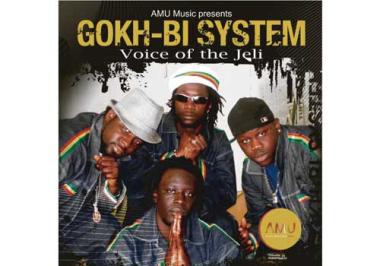Hailing from Pikine, Guinaw Rail, a poor part of Dakar, Senegal whose name literally translates as "the other side of the tracks," the African hip-hop group Gokh-Bi System believes that the universal language of music can be used to connect countries and cultures to cultivate a more just, peaceful world.
The word "gokh-bi" means neighborhood, which MC Mamadou Ndiaye, on the band's record label's website, explains is essentially a kind of family, a concept that represents the band's mission: "In Africa, if you live in the same neighborhood, you are like family. Through our music we want to spread that sense of family we share in Senegal around the world. Even though we live in different countries and speak different languages, we are all part of a universal family. If countries across the entire world respect that our fate is linked, there would be no conflict or war."
The group itself is a microcosm of this ideal, combining the Senegalese ethnic groups Jola, Serer and Wolof, writing lyrics in English, French, Arabic and several Senegalese dialects, and fusing many different musical influences into their own sound.
Gokh-Bi System was created in 1995 by Mamadou Ndiaye and brothers Diasse Pouye and Pape Pouye. As they began composing original songs, they enlisted Backa Niang for percussion and vocals and Sana Ndiaye to sing and play the ekonting, an ancient, three-stringed gourd instrument resembling a large banjo that adds a unique, soothing element to Gokh-Bi Systems's sound.
As young boys in Senegal, the were drawn to the socially conscious American hip-hop of the 1980s. They discovered a strong connection between the rhythms, style, and messages of hip-hop and those of the West African traditions of Tassu and the jeli. According to Ndiaye, "For centuries in Senegal, we've had a style of early hip-hop called Tassu which sounds like drumming and clapping against a chant." Storytellers called jelis used this tradition to preserve oral history, record genealogies, advise, entertain, and make political commentary.
The musicians of Gokh-Bi System have continued this tradition by using their music to spread messages of peace and love and to criticize what they see as unjust. They combine Tassu and other forms of traditional West African music and meld it with the modern sound of American hip-hop to create a fusion of styles that they have dubbed "Ancient Meets Urban."
Gokh-Bi System first came to the U.S. in 1999 as ambassadors for the Senegal-America Project, a cross-cultural initiative founded by local percussionist Tony Vacca. Through this project, Gokh-Bi System worked to expose American children to African music and culture, playing for high schools, universities and community groups.
The exposure from this project led to many performances in festivals and eventually tours throughout the U.S. In 2005 they released the album Mission of Music, and the video for the album's title track was featured on VH1 Soul. Their new release is Voice of the Jeli. The single "Rap Tassu," available online, is a fundraising effort for flood and malaria relief efforts in Dakar.
Gokh-Bi's CD release party happens at the Iron Horse in Northampton on April 25 at 10 p.m. They will be joined by bassist and keyboardist Jo Sallins, drummer Matt Garstka, and guitarist Greg Garstka.



